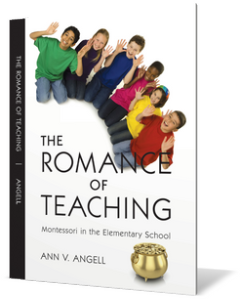THE BENCHMARK DILEMMA September, 2008 Denison Montessori School
1. The only possible merit of all that time spent—taking and scoring benchmark tests—is the opportunity to study your own students’ responses.
We have to do some higher level thinking here, not get trapped in the myth of number-crunching. Scores don’t matter; essays and incorrect answers might, if we take time to read them and think about them. We might even raise test scores by directly addressing errors, but we must remember that is NOT our goal. Our end must continue to be assisting the child’s development. We MUST remember that walking barefoot in the garden is more educational than memorizing the multiplication tables. It just IS.
2. My primary concern continues to be the damage done to the confidence and the self-esteem of middle to lower-performing students who are discouraged by the tests; their mental development stunted. We need only remember Dr. Montessori’s metaphor of the planted seed being pulled up by its roots to examine its growth. Mental processing—the assimilation and accommodation of new concepts—is HIDDEN, SLOW, AND COMPLEX. It should not be disturbed.
When we capitulate to the district’s demands for accountability, we are going directly against our philosophical tenets. It is just important to remember that, I think. That contradiction asks us to question our motives, our reasons for allowing this testing mania to go on in our school. I think we should ask ourselves seriously, “What are we afraid of?” And then to ask, “how real are those fears?” We should spend time debating that question based on facts.
3. MATH scores are the nemesis of our test results. So……..what shall we do?
• First, it would be good to admit that we are testing children on the outcomes of a curriculum that we don’t use. SHOULD WE JUST ORDER EVERYDAY MATH? (I think we should at least debate the merits of doing that, perhaps supplementing it with Montessori materials, but focusing on the format and sequence of Everyday Math.)
• If we administer the Benchmark tests, we should find out whether there is data to show the validity and reliability of the items on the test. In particular, I am skeptical of the math items. Who is creating these items, based on what and tested for reliability and validity in what way? Are the math items simply cobbled together from the testing materials that accompany the Everyday Math curriculum?
• It is probably possible for our students to ace tests like the Benchmarks or the CSAPs by the end of 3rd and 6th grade with only the Montessori curriculum in action. But it would have to be in action fully and full time. Teachers would have to be released from the fear of poor test scores every six weeks. We would have to stop scaring both teachers and students with what they haven’t taught or don’t know. We would have to provide time for concepts to develop undisturbed. We would have to assure teachers that their training is valid, that the materials work with enough time and patience, that both teachers and students will be allowed the time necessary for seeds to be planted and roots to take hold and concepts to grow. THAT KIND OF TEACHING IS THE SHIFT. We already know how to do it. It is education for an unknown future, and we COULD offer it to our students. Perhaps we could even set an example for others. Lead the way!
These were finally the points that I made in my 15-minute audience with the administration about the questionable value of the Benchmark tests and the Montessori alternative that we offer at our school. The goals of the two are directly in conflict. And so are the teachers. Teachers trained in the Montessori curriculum are faced with dilemmas every minute of the day as they try to make decisions about curriculum and instruction. What will truly educate the children’s human potential? To me it seems nearly impossible to teach for the future and also insist that test scores of this kind are of paramount importance.
